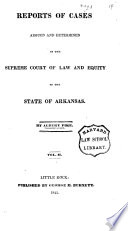 | United States. Congress - 1835 - 676 pages
...appointing power, and to plant them as a safeguard against executive influence. It were idle to say that it was the intention of the framers of the constitution to confine the Senate to a consideration of some particular matters personal to the nominee. If it were... | |
 | 1835 - 674 pages
...appointing power, and to plant them as a safeguard against executive influence. It were idle to say that it was the intention of the framers of the constitution to confine the Senate to a consideration of some particular matters personal to the nominee. If it were... | |
 | Henry Clay - 1838 - 734 pages
...result from local and separate acts of the States, there is evidence — I think abundant evidence — that it was the intention of the framers of the constitution to give to Congress a controlling power over the whole subject, to the end that there should be, for the... | |
 | Arkansas. Supreme Court - 1841 - 662 pages
...have all been carefully and critically examined by the court, and from them it appears satisfactorily, that it was the intention of the framers of the Constitution to limit and restrict the Supreme Court in the exercise of original jurisdiction to such cases as the... | |
 | Daniel Webster - 1843 - 582 pages
...result from local and separate acts of the States, there is evidence — I think abundant evidence — that it was the intention of the framers of the constitution to give to Congress a controlling power over the whole subject, to the end that there should be, for the... | |
 | Wisconsin. Legislature. Senate - 1849 - 938 pages
...State Legislatures, under provisions similar to that in our Constitution.— (17 Ib. 219.) It may be that it was the intention of the framers of the Constitution to exclude Postmasters from a seat in the Legislature ; but the question is — Have they done so? —... | |
 | Daniel Webster - 1851 - 578 pages
...could result from local and separate acts of the States, there is evidence, I think abundant evidence, that it was the intention of the framers of the Constitution to give to Congress a controlling power over the whole subject, to the end that there should be, for the... | |
 | Michigan. Supreme Court, Randolph Manning, George C. Gibbs, Thomas McIntyre Cooley, Elijah W. Meddaugh, William Jennison, Hovey K. Clarke, Hoyt Post, Henry Allen Chaney, William Dudley Fuller, John Adams Brooks, Marquis B. Eaton, Herschel Bouton Lazell, James M. Reasoner, Richard W. Cooper - 1916 - 830 pages
...electors of a particular class, whose qualifications have been defined by legislation. We think it clear that it was the intention of the framers of the Constitution to provide, in case a local or special act were passed by the legislature, that it should be submitted,... | |
 | Michigan. Supreme Court, Randolph Manning, George C. Gibbs, Thomas McIntyre Cooley, Elijah W. Meddaugh, William Jennison, Hovey K. Clarke, Hoyt Post, Henry Allen Chaney, William Dudley Fuller, John Adams Brooks, Marquis B. Eaton, Herschel Bouton Lazell, James M. Reasoner, Richard W. Cooper - 1890 - 784 pages
...is this so in reference to the equalization of the assessment of the taxes ; and it cannot be said that it was the intention of the framers of the Constitution to permit powers to be delegated to the cities to increase or diminish their representation upon the board... | |
| |